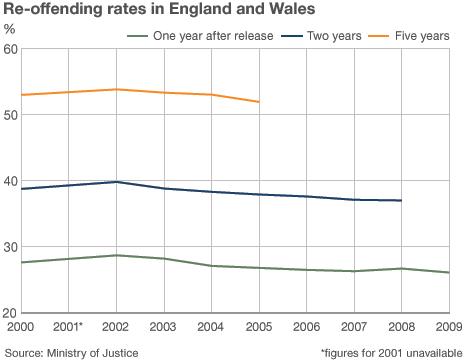Private sector rehabilitation plans defended by government
- Published
Matthew Rockall says he has turned his life around with the help of a mentoring scheme
The government has defended plans to allow private firms and charities to supervise low-risk offenders on probation in England and Wales.
Justice Secretary Chris Grayling said, under the plans, security firms and voluntary groups would manage probation on a "payment by results" basis.
Prisoners serving short sentences would also have to undertake compulsory rehabilitation for the first time.
Trade unionists fear that the move could "compromise public protection".
Shadow justice secretary Sadiq Khan said: "Payment by results in criminal justice is untested, and the Tory-led government are taking a reckless gamble with public safety."
But Mr Grayling told MPs that anyone who becomes classified as a danger to the public during their rehabilitation would see their case go back to the public probation service.
He has also said: "It is madness to carry on with the same old system and hope for a different result."

Most released prisoners and people serving community sentences are managed by the public sector probation service - provided by 35 trusts across England and Wales.
But under the Ministry of Justice's (MoJ) proposals, responsibility for monitoring some 200,000 medium- and low-risk offenders will transfer to the private sector.
Private companies and charitable bodies successfully bidding for contracts will be paid according to their results in cutting re-offending.
However, the public probation service will continue to supervise some 50,000 high-risk offenders, including all serious violent and sexual offenders.
Harry Fletcher of probation officers' union Napo said the "astonishing" overhaul was being "rushed through without proper thought to the consequences".
The Probation Association said: "Although these offenders are deemed medium and low risk of harm, they include child protection cases, violence against the person and domestic violence cases.
"This group also includes offenders at high risk of reoffending, such as prolific burglars, chaotic drug users and gang members. These are all complex and potentially dangerous individuals who require professional expertise in their management."
An MoJ spokesman said £1bn was spent each year on running community sentences, and £800m of that was spent on probation.
According to MoJ figures, 47.5% of all offenders released from custody in 2010 re-offended within 12 months, and 57.6% of those sentenced to under 12 months released in the same period went onto re-offend within 12 months.
Prisoners serving under 12 months only currently undergo voluntary rehabilitation and are otherwise freed without support or supervision.
The MoJ says those serving more than 12 months have statutory supervision on release - this can involve regular meetings with an offender manager, curfews and a requirement to attend drug or alcohol rehabilitation courses.
A mentoring scheme is also being introduced where similar offenders are offered support such as finding accommodation and returning to work.
The new proposals would see all freed prisoners subject to both the mentoring scheme and statutory supervision.
The government will offer £500,000 to voluntary and community sector groups to help them prepare to bid for probation contracts.
Khan: "Recipe for disaster if things go wrong."
In 2011 some 90% of those sentenced in England and Wales had offended before - a record number - and almost a third had committed or were linked to 15 or more crimes.
Final reforms for the probation service are expected to be implemented across England and Wales by spring 2015.
Local authorities are responsible for the majority of probation services in Scotland and are funded by the Scottish Government.
Probation in Northern Ireland is dealt with by the Department of Justice. Statutory probation services are not offered to those serving 12 months or less, but probation officers will work with "persistent offenders" regardless of their sentence length.
- Published9 January 2013
- Published23 December 2012
- Published20 November 2012
- Published18 August 2012
- Published13 July 2012
- Published30 June 2010